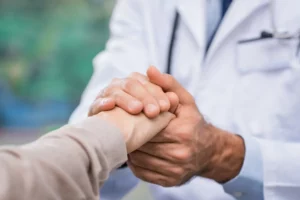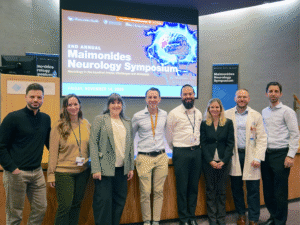COVID-19 has changed our lives and because many of us were desperate for answers, we turned to the internet and social media. As a result, EBM or evidence-based medicine, has taken the backseat. Patrick Borgen, MD, discusses evidence-based medicine as it relates to COVID-19 and explores why it is in our best interest to listen to and trust experts as much as possible.
Listen on Spotify, Apple Podcasts, Google Podcasts, iHeartRadio, or Stitcher.
Scott Webb (Host): COVID-19 has changed our lives, perhaps forever. And because many of us were so desperate for answers, we began to turn to the internet and social media over the past couple of years for answers. And as a result, EBM or evidence-based medicine kind of began to take a backseat. And I’m joined today by Dr. Patrick Borgen. He’s the Chair of Surgery at Maimonides Medical Center, and he’s here today to explain EBM and encourage us all to listen to and trust experts as much as possible when it comes to COVID or really any other medical concerns.
This is Maimo MedTalk. I’m Scott Webb. Dr. Borgen, thanks so much for your time today. We’re going to talk about evidence-based medicine and COVID-19, and a whole bunch of interesting stuff here. So as we get rolling, just as a foundational thing, what is EBM or evidence-based medicine, and I guess basically what does that mean exactly?
Dr. Patrick Borgen: Every decision that we make, whether it’s a decision to order a test or administer a drug or do an operation, is based on best available evidence. And overwhelmingly, it has been based on clinical trials, often randomized clinical trials that have a significant enough number and power to really give us the truth. And so, we take the results of those large-scale studies and we trust them to base our patient decisions on. So, EBM is the foundation that we use to treat patients today.
Scott Webb: And I think that’s a comfort, you know, as a patient, right? Of course, doctors and nurses are patients too. But as a patient, I want to know, I want to believe that my primary provider, when I get referrals, you know, those specialists, that everybody’s trying to base things in evidence, right? Evidence-based medicine. So, the tricky thing though, doctor, in doing my research for this, I saw that some folks sort of believe that EBM may have sort of morphed into something else. Because, you know, as we went through COVID, so much in media and social media, and things got so politicized along the way that some folks now believe that EBM maybe stands for evidence, beliefs, and media.
Dr. Patrick Borgen: I haven’t heard that, but I like it. In medicine, we have the requirement to maintain our licenses to do continuing medical education, CME. In surgery, we have MOC, maintenance of certification, and this is really all about reviewing the latest and the best and the strongest evidence out there so that as our understanding of medicine changes, and remember, medicine changes day by day, week by week, month by month, and to make sure that we are offering the latest and the safest, you know, information to our patients.
What happened during COVID, and I’ll go into a little bit of detail because I think it’s significant, was we faced something that my generation of physicians never ever saw. In Brooklyn, New York, we were one of the tips of the spear of the COVID-19 pandemic. In fact, two of our ZIP codes still are in the top 10 for total number of cases in the United States. So in March of 2020, our hospital was overrun with very, very ill patients who tested positive for the COVID-19 virus, and it increased exponentially 10 patients the first day and a hundred the second day and, pretty soon, we were at capacity. Between March and April of that year, we admitted more than 2,000 patients with COVID-19. And it’s appalling, 711 of those patients died in the hospital of COVID. We never have seen a virus like this. There was no knowledge base. We couldn’t reach up on the shelf and pull existing treatments down for COVID-19. And so, it makes perfect sense that as we and hundreds of other hospitals face this, we were desperate for help. We were desperate to offer something to patients. And so, there was a literal explosion of small, often poorly controlled studies that exploded across the United States and across the world, which represented glimmers of hope for what we could offer these patients.
Scott Webb: Yeah, I mean, I think one of the troubling things, doctor, is that during all of this, so many people began to feel like they were experts themselves because they have a computer, because they have a phone, because they could Google things. I see things on social media. People say, “Well, do your own research.” Okay, well, I’m not a researcher. I’m not a scientist. I’m not a doctor. So, how do we, you know, “do our own research”? What would you recommend for people, for lay people? How do we even try to keep up with this kind of stuff?
Dr. Patrick Borgen: So, everything you’re saying is correct. And the phrase that I and others used was that we were building the plane while we were flying it. And that’s very much what it felt like. And so, what happened in the medical profession was large institutions like ours compared notes on a daily basis. “What are you seeing? What’s working? What’s not working?” I’ll give you an example. One of the things that was completely unique to COVID-19 was that it made blood clot really easily in the human body. And so, part of the panorama of COVID was blood clots and ischemic legs or bowel or fingers or even strokes and heart attacks. In fact, hundreds of patients actually died at home from these blood clots.
As we were beginning to understand COVID-19, at the peak of this, the New York City Fire Department was actually retrieving more than 300 citizens per day who died at home from these blood clots, from the virus. And so, the best minds across the country and across the world were in daily communication, talking about what their experience was. In fact, when you begin to look at the torrent of publications to date, there are more than 184,000 published articles on COVID-19, 184,000. That’s an insane number. And the problem with that number was that overwhelmingly, these were small studies, almost always less than a hundred patients, and almost always came to results that were going to eventually not be reproduced.
There’s something in medicine called apophenia, and this is our tendency to see a meaningful pattern where none truly exists. And it’s part of human nature. We have to be aware of it. And so, apophenia played a role as people looked at these small studies, you remember the controversy about hydroxychloroquine, which based on a study of 30 patients, 30 patients, 15 of whom received the pill wound up in less than a week on the President of the United States’ docket to discuss as a treatment for COVID. That’s never happened in the history of medicine before. And so, all of the rules that we had about reviewing a study about critically reviewing a study were suspended, and it’s actually understandable given the dire nature of the virus. But it harmed us, it was not good for us, it was not good for our patients.
One of the things that exploded during COVID-19 was a new type of manuscript published online, which are called pre-prints, and these are completed manuscripts that are posted to a special server under a searchable title. And it was done primarily to get information out quickly, but patients from home could search and identify and read these pre-prints. The largest one, which is called medRxiv, which was launched in June of 2019, wound up having over 11,000 COVID-related submissions in the first year. Only 11% of those were ever actually reviewed and published. But you would see these studies quoted in news articles or patients who said, “Oh, I did my own research and I found this article, and so this is what I’m going to do.” This was a goldmine, by the way, for journalists who were looking for the next big story about COVID, who would find these articles and publish in the general press these stories. So when you talk about patients using Dr. Google, it’s true. It’s actually true. And again, I’m not being critical of folks who did that because we were all desperate. We were all desperate. But the fact is, is that it damaged the time-honored, proven machinery for evidence-based medicine.
Scott Webb: I think you’re so right, you know, and then trying to do some research myself, Dr. Googling, to prepare for this conversation with you today. You know, that’s what I found, is that people were desperate, that’s such a perfect word that you used, we were all desperate to understand for the information, to try to do our “own research.” The problem is what we were researching, what we were finding often was not evidence-based medicine. Relatively small samples, you know, 30 people, as you say. And then, sort of people just extrapolating that out over this huge unknown, you know, unseen thing. And we could probably speak for hours, doctor, all day perhaps about all of the complications, all of the intricacies of all of this. But I think what I’m left wondering is, yeah, sure, COVID has changed all of our lives, perhaps forever changed medicine and science and everything. Is it possible to get back to old school, like, you know, time-tested EBM in the future? Do you see that happening?
Dr. Patrick Borgen: There was a study out of France, that was the 30-patient hydroxychloroquine study and it came to some sweeping conclusions. And some other evidence-based medicine experts pointed out that, “Well, gee, this is 30 patients and only 15 got the pill and there was no followup.” And so, the doctor who published the first article filed a suit against the critic. I never saw that before. And so, I think that the world looked at that and said, “Okay, guys, we have hit rock bottom here.” And I think absolutely the pendulum has swung back towards time-honored traditions. I don’t think we’re completely there yet. I think that dealing with the challenge of pre-prints, which are here to stay, is a real challenge, because there’s not really a filter on that information source. But I do think it’s possible to get back to a state where we really can trust EBM. I think that’s likely.
Scott Webb: Yeah, I certainly hope so. The last thing I want to hear is, you know, doctors, scientists, specialists, being concerned that we’re not basing our decisions, our conclusions, we’re not getting our information properly. Like, I guess I just am wondering, what are your final thoughts and takeaways, whether it’s about COVID or EBM, what do you most want folks to know?
Dr. Patrick Borgen: I think that your best source is still a doctor who you trust. I think second opinions are great. I think third opinions are great. Don’t take this responsibility of making your own healthcare decisions. My specialty happens to be breast cancer and no area of oncology has changed more over the last 30 years than breast cancer, and that’s good news because the survival rates are at all time high. We’ve deescalated the surgery enormously. Medicines are less toxic. We’re using the patient’s own immune system now against their own cancers. But breast cancer has changed monthly, especially over the last decade. And so, you need to find a doctor who is staying current, who is cutting edge, and, frankly, who’s not only a good individual, but who’s part of a team cancer. Most medicine today is a team sport, but certainly cancer is.
And so, my take-home message is find a team that you trust and that you respect and that respects you, and build that relationship. Don’t take the responsibility of Dr. Google and risk going onto a pre-print or a site where incorrect information might be there. I guess my final thought is I think overwhelmingly the intentions were honorable during COVID. I think that people were desperate and I think social media was an accelerant for the dissemination of all information and including wrong information. I think we’re headed back in a good direction again. And I also think that we need more formalized training in evidence-based medicine for the next generation of doctors. I think that’s going to be really important, so that they can separate the wheat from the chaff on how studies are done, how studies are analyzed and interpreted. I think that’s going to be really critical to this ever-changing medical world that we live in.
Scott Webb: Yeah, that’s perfect. I think you’re right. Hopefully, we can get back to basing things in evidence and research and time-tested, honored medical and scientific traditions. So, this is great stuff today, doctor. Thank you so much.
Dr. Patrick Borgen: Thank you so much.
Scott Webb: And to make an appointment with Dr. Borgen, call 718-765-2550.
Host: To learn more about Maimonides Medical Center, please visit maimo.org. This has been Maimo MedTalk. I’m Scott Webb. Stay well.







